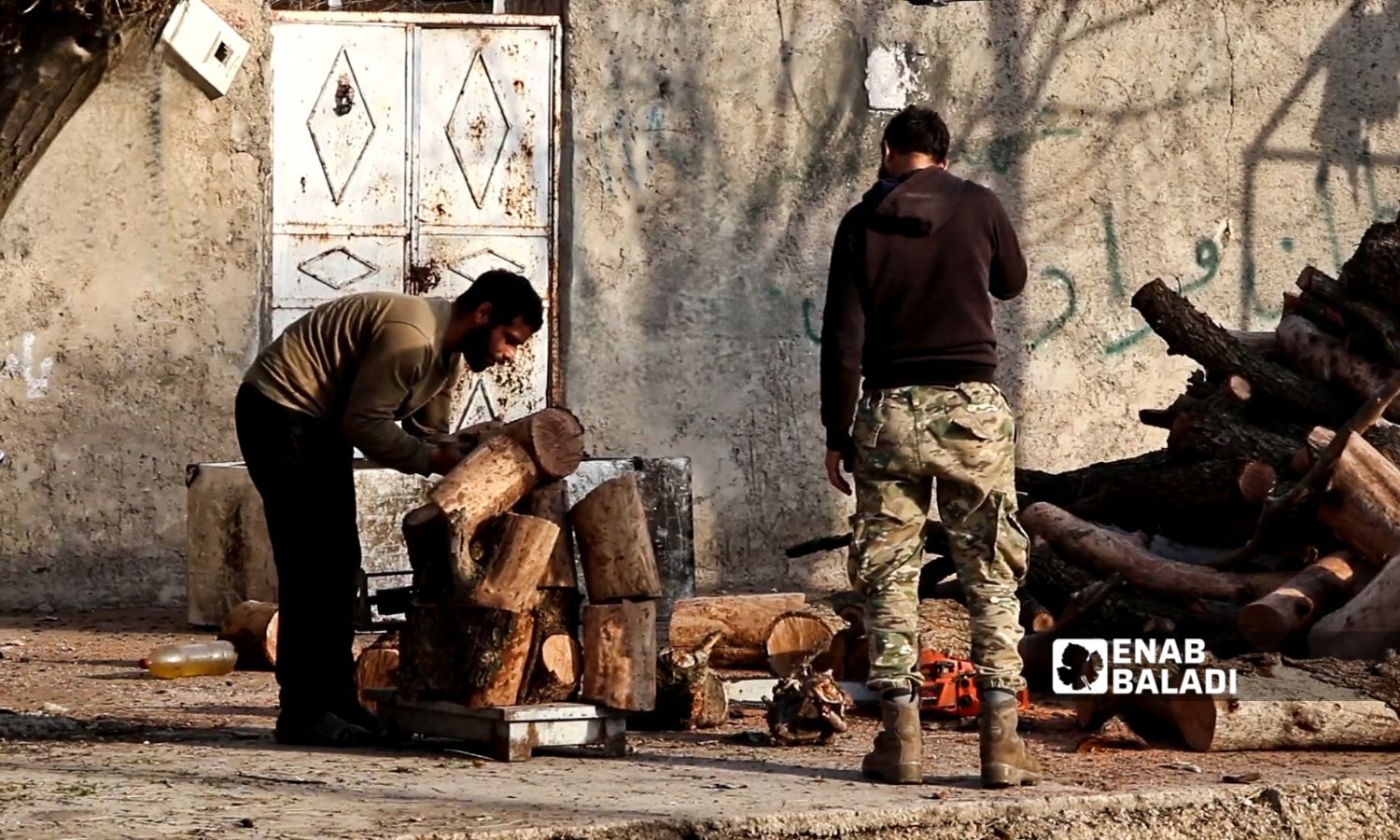



Enab Baladi – Ras al-Ain
For over a month, the fifty-something-year-old Fayez al-Maliki has been searching for heating materials for his family of six children in Ras al-Ain, northwestern al-Hasakah, that fits his financial situation, especially since he lives on his pension of 320,000 Syrian pounds (21.5 US dollars).
Despite his repeated attempts, al-Maliki has not found what he is looking for yet, as the prices of diesel and wood are high. Therefore, he had to return to his village of Hamid, east of Ras al-Ain, to collect leftover wood from his brother’s field that was planted with cotton.
As winter arrives, many residents of Ras al-Ain, which has a population of 115,000, face difficulties in preparing for the cold season. This year, fuel oil and heating wood prices have risen, pushing some to resort to alternative means such as plastic (nylon) and cardboard.
Enab Baladi monitored the prices of heating materials in Ras al-Ain, where the price of a barrel of diesel (220 liters) reached 2.5 million Syrian pounds, the price of a ton of wood reached four million pounds, while the price of a bag of coal (25 kilograms) reached 50,000 pounds, and the price of a ton of pistachio shells reached 2.5 million pounds.
These prices are considered high compared to the economic situation, with daily wages for workers ranging between 80,000 and 100,000 Syrian pounds (6.5 dollars).
Some residents resort to cutting down trees from their homes or public trees to obtain firewood, while members of the armed factions affiliated with the Syrian National Army (SNA) stand behind most logging operations, making it a widespread phenomenon despite the existence of laws from local authorities prohibiting it.
Farida al-Ahmad (42 years old) roams the streets of Ras al-Ain with her two children to collect nylon and cardboard to burn at night and provide heating for the home, according to her statements to Enab Baladi.
Al-Ahmad, who is displaced from Hama, turned to her acquaintances and relatives to borrow money to buy a barrel of diesel, but she could not secure any amount, so she had to rely on waste plastic materials, despite her two children suffering from chest and bronchial infections due to the odors emitted from nylon burning.
As for the young man Majd al-Saadoun, he stated that he was forced to buy diesel in small quantities ranging between 50 and 60 liters, as the amount he has is not enough for more than a month and a half. He noted that if his supply runs out, he will resort to burning old clothes and damaged shoes in the house to provide heating.
Al-Saadoun (32 years old) works in the municipality of Ras al-Ain with a salary close to one million Syrian pounds, which barely meets his basic needs and is insufficient to buy adequate quantities of diesel.
Ras al-Ain is located along the Turkish border, controlled by the Syrian National Army, and is surrounded by fronts of fighting with the Syrian Democratic Forces (SDF). The Turkish border is considered its only gateway to the outside.
Kamal Farid, a trader of heating materials in Ras al-Ain, told Enab Baladi that the prices of heating materials increase annually, as the price of a barrel of diesel (220 liters) last year ranged between 1.5 million Syrian pounds and 2.2 million pounds.
He added that the SDF prevents the entry of fuel into Ras al-Ain, which led to increased prices in the city, with the price of the barrel reaching around 2.5 million pounds.
He mentioned that the price of a bag of coal rose from 15,000 Syrian pounds to 50,000 pounds this year, due to the depreciation of the Turkish lira against the dollar, as coal is imported from Turkey.
A store Farid buys from experienced a 35% decline in sales this year compared to 2023, due to the inability of the majority of residents to afford heating materials.
The spokesperson for the Ras al-Ain local council, Ziad Maliki, told Enab Baladi that the rising prices of heating materials have negatively impacted the majority of residents in Ras al-Ain due to the blockade imposed by both the SDF and the regime on the region.
He explained that the local council is currently studying a comprehensive plan to identify the most vulnerable and impoverished groups in the community to provide them with support through the Social Services Directorate.
Maliki mentioned that the council will submit a list of names of families that cannot afford to buy heating materials, along with a schedule outlining their needs, to charities and humanitarian organizations concerned with supporting them.
Ras al-Ain is witnessing a lack of job opportunities, with agriculture and livestock breeding being among the primary professions in which most residents work, forming a major source of income.
if you think the article contain wrong information or you have additional details Send Correction